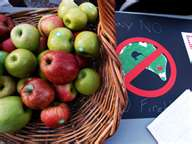 A NEW Zealand apple grower has been caught trying to send banned waste from apple trees to Australia days after the trans-Tasman market reopened.
A NEW Zealand apple grower has been caught trying to send banned waste from apple trees to Australia days after the trans-Tasman market reopened.
The load was stopped by Biosecurity Australia on a final inspection in New Zealand before being airfreighted to Australia.
The incident has infuriated Australian apple growers, who have long argued that the disease risks of importing NZ apples are too great.
Apple and Pear Growers Association of SA president Mike Nicol said it shows what growers have said all along and that Biosecurity Australia will have to be vigilant.
“If that has happened in the first few days after the Australian apple market opened up, it shows that what we are worried about is a fact,” Mr Nicol said.
“If New Zealand is going to keep exporting, can we rely on Biosecurity inspectors to be vigilant when the loads start increasing substantially in the longer term?”
State Agriculture Minister Michael O’Brien said the discovery emphasised the need for precautions as debate raged over the NZ imports.
“I welcome the vigilance of Australian quarantine officers, but this discovery underscores the need for South Australia to take additional measures to protect our orchards.”
The Advertiser revealed last week that quarantine zones will be introduced to protect apple growers in the Adelaide Hills, Riverland and South-East, with the move backed by Cabinet this week.
Apple and Pear Australia Ltd chairman John Lawrenson said it was extremely disturbing that the apple tree debris and a quarantinable pest had been found within days of the start of apple imports from New Zealand.
Mr Lawrenson warned that there was a very real risk that Australia could have fireblight, European canker and leaf-curling midge in the first full year of New Zealand apple imports.
“We also said that trash is difficult to exclude from cartons and it is well known that trash is a carrier of the fireblight bacteria,” he said.
Apple and Pear Growers Association of SA chief executive Greg Cramond said the industry had always been concerned that it was impossible to keep trash out of consignments.
“This . . . is the easiest way for fireblight to get into Australia,” he said.